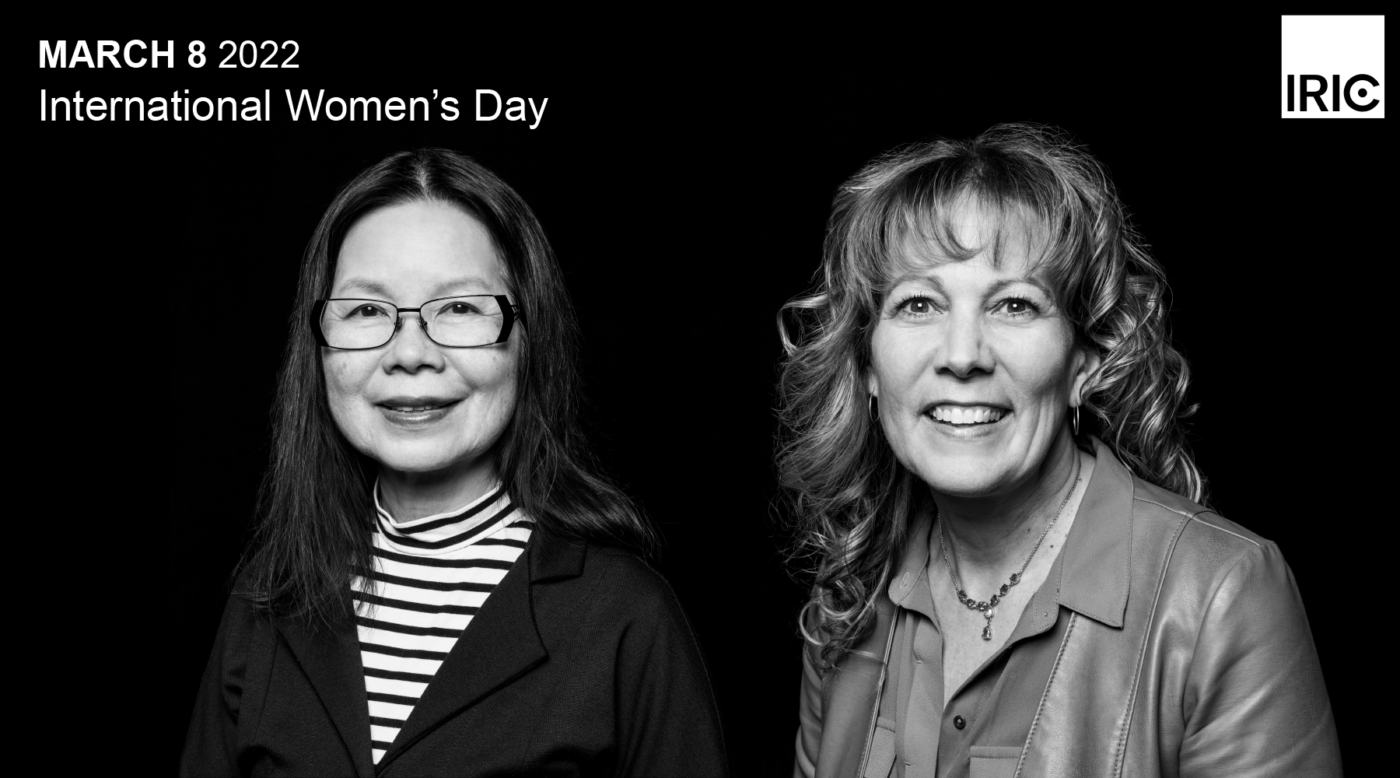News
IRIC celebrates International Women’s Day
Published on March 8, 2022
IRIC is taking advantage of International Women’s Rights Day to recognize and highlight the exceptional contribution of all its scientists who work to make a difference.
On this occasion, IRIC invites you to meet two exceptional women who, each in their own way, are making a difference. Trang Hoang and Anne Marinier have agreed to answer a few questions to share their vision and their scientific trajectory.
Why did you choose the field of science? What are your motivations?
Trang Hoang : Scientific research is a passion driven by curiosity and a passion to discover, to think outside the box to open new horizons and make discoveries. I remember a discussion session with a young student about his experiments that had not yielded the expected results and that could have been considered negative results, leading us to move on to other questions. In this case, we were confident that it was not an experimental error, but a challenge that we were facing. After our brainstorming session, he did the same experiment again but with different perspectives, and at the end of the day, his results gave us our first glimpse of what caused the mutations in an oncogene in leukemia. This is fascinating! In addition, in our field, we are working on cancer and want to open new doors that could eventually translate into new clinical options. In many cases at IRIC, there are already advances with therapeutic significance!
Anne Marinier : As far back as I can remember, I always wanted and knew that I would be a chemist. At the risk of sounding boring or ‘cliché’, I guess it’s most likely because of my parents’ influence. My father obtained his PhD in chemistry at the University of Montreal and pursued post-doctoral studies in Cambridge, England. He worked for a few years in the pharmaceutical industry (whose laboratories I visited at the age of 7 were very impressive). He then joined the team that created the Université du Québec à Rimouski: he was dean of graduate studies and research for 13 years before continuing his career as a chemistry professor. His passion for science and the appreciation of this profession by both my parents, and particularly my mother, certainly influenced my choice to embrace this career. And all this obviously crystallized when I read the biography of Marie Curie, the role model for many women in science.
What is your greatest achievement since starting your career in science?
Trang Hoang : In a research career, there are really no big or small accomplishments, each contributing to a larger building. Beyond our own specialization, the fact that we all have the opportunity to contribute to the triple mission of innovative cancer research, training of the next generation, and valorization of research is a great achievement that I share here with all my colleagues. Each person contributes in their own way, and together we can continue to advance our knowledge of cancer and ultimately make a difference in clinic.
Anne Marinier : The discovery of the UM171 molecule, in collaboration with Dr. Guy Sauvageau. It demonstrates the power of multidisciplinary collaborations. This molecule, which multiplies stem cells, has already saved several patients with blood cancers. This achievement is clearly my proudest moment, the greatest reward of my career and what a drug discovery researcher aspires to. When a patient treated with a UM171 graft hugged me and told me that she considered me her second mother since she had come back to life, I can’t hide the fact that tears came to my eyes. The discovery of UM171 is also a convincing example of what the Drug Discovery Unit, which I set up a few years ago with Michel Bouvier (another achievement of which I am also very proud) can offer in terms of drug development but also as a contribution to basic research. This UM171 molecule, which is now the basis for the creation of two companies, is also a powerful tool that has been reused in academic research and has allowed Guy Sauvageau and his team to discover the biological mechanisms underlying the aging of stem cells and probably other cell types.
What would you like to say to the next generation of scientists, especially to young women who would like to pursue a career in science?
Trang Hoang : Having to define your own path might seem daunting. On the contrary, it gives us a lot of freedom and an opportunity to be creative. Learn to trust your own judgment and stay focused on what is important. Scientific research moves society forward: we have seen this several times during the pandemic. It is because of decades of research that we were able to so quickly obtain vaccines that are beginning to deliver us from Covid-19. In an interdisciplinary research environment, we need all talents, inclusively, to move forward together. Let’s continue to promote innovative scientific research and scientific literacy.
Anne Marinier : I would tell them that a career in science can be fulfilling, exciting, rewarding and definitely not boring! I worked in the pharmaceutical industry and then in academia. I developed skills in intellectual property, business development, management, etc. As my father told me many years ago, a career in science can open many doors and lead to many opportunities, as long as you are willing to work, dare, go for it and trust yourself.
On March 8, at 12:00 p.m., the Faculty of Medicine of the Université de Montréal organized an event to highlight the inspiring career of Trang Hoang, Principal Investigator and Director of the Hematopoiesis and Leukemia Research Unit and Full Professor in the Department of Pharmacology of the Faculty of Medicine of the Université de Montréal. She discussed the importance of mentoring in academia and answered questions related to her background and career.
